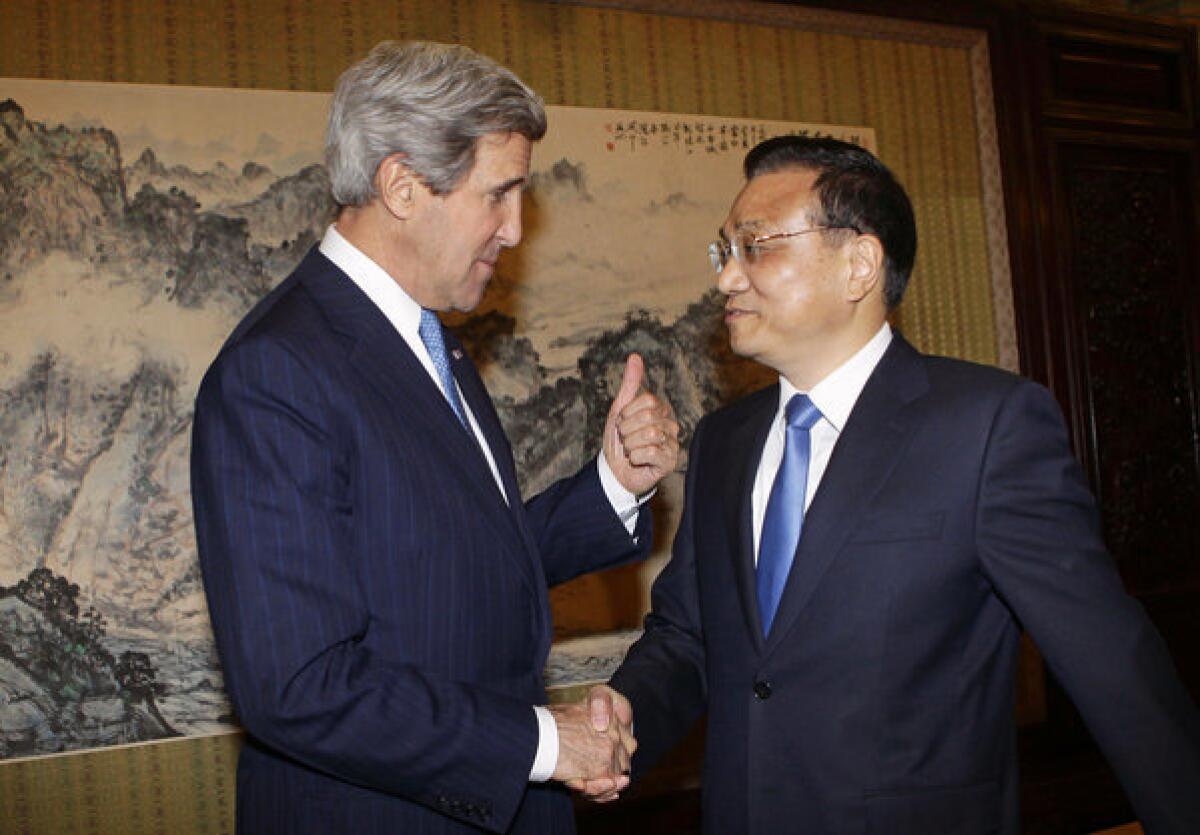Kerry: Beijing to work with U.S. to quell North Korea nuke threat

- Share via
BEIJING -- After meeting with top Chinese leaders Saturday, Secretary of State John Kerry said Beijing had pledged to work with the United States to urge North Korea to abandon its nuclear weapons.
“There is no question in my mind that China is serious, very serious, about denuclearization,’’ said Kerry, appearing exultant but weary at a Saturday night news conference at a hotel near the Diaoyutai State Guesthouse in Beijing. He said there was “more agreement than disagreement” from the Chinese.
Kerry, on his first trip to China as secretary of State, described what he called an “unprecedented joint statement” calling for North Korea to abandon its nuclear program, although it appears to have been a verbal statement and not a formal communiqué.
During a packed day, Kerry met with China’s new leadership team -- President Xi Jinping and Premier Li Keqiang -- his counterpart, Foreign Minister Wang Yi, and State Councilor Yang Jiechi, China’s top diplomat. In addition to North Korea, the sessions touched on the subjects of Iran and Syria, online security and climate change. Kerry said he also brought up human rights, but didn’t elaborate.
Perhaps because it was Kerry’s first trip, the atmospherics were far better than in September during Hillary Rodham Clinton’s final visit as secretary of State, when disagreements on human rights, Internet freedom and the South China Sea clouded the mood.
If there has been one positive outcome out of recent provocations by Pyongyang, it has been to nudge Beijing closer to the United States. The Chinese worry that the torrent of explicit threats by North Korea to attack the U.S. and its troops in Asia with nuclear weapons are leading to an American military buildup in the Pacific, exactly what Beijing wishes to avoid.
“China may be at a tipping point with North Korea,’’ said Zhu Feng, a prominent international relations scholar at Peking University. “In 10 years, I haven’t seen a moment like this when China is reconsidering its North Korea policy.”
Beijing broke precedent and supported U.N. sanctions against its old communist ally after its nuclear test in February. Perhaps a reflection of the sanctions, bilateral trade between China and North Korea fell 7.2% in the first quarter of the year after years of steady increases.
However, the U.S. would like China to apply additional economic leverage against Pyongyang by squeezing bank accounts of Chinese companies that deal in weapons and handle cash transactions for the North Korean elite.
At his news conference, Kerry would not say what concrete steps Beijing would take again Pyongyang. As he had on Friday in Seoul, he suggested an opening for renewed dialogue.
“We don’t want to get into threat for threat or confrontation language. There has been enough of that,’’ he said.
North Korea is in the midst this weekend of celebrations marking Monday’s birthday of Kim Il Sung, the nation’s late founder. Kim Jong Un, the 30-year-old grandson and the third in the dynasty, has been running the country since December 2011 when his father, Kim Jong Il, died.
North Korea has appeared poised to set off a barrage of missiles from its east coast. But South Korea’s official Yonhap news service, quoting unnamed intelligence sources, said there had been no movement of the missiles’ launchers for several days, suggesting Pyongyang might have delayed the launch, perhaps at the behest of China.
The Chinese for now are playing their cards close to the vest. Speaking to reporters Saturday, Yang Jiechi simply repeated Beijing’s stock phrases about North Korea. “China is firmly committed to upholding peace and stability and advancing the denuclearization process on the peninsula,’’ Yang said.
The ties between Beijing and Pyongyang were forged in the 1950-53 Korean War, when Chinese forces crossed the Yalu River to push U.S. and other troops out of North Korea. Mao Tse-tung famously referred to the relationship as “lips and teeth.’’
The consensus among Chinese policymakers long has been that North Korea, despite its desperate poverty, cannot be allowed to collapse because it serves as a buffer between China and U.S. ally South Korea.
Although China’s state press has railed almost daily against North Korea, an editor for a newspaper published by the Central Party School in Beijing was removed from his post recently after writing a column that called for China to abandon North Korea.
“We don’t support what North Korea is doing but it is not so easy to sever ties,’’ said Sima Nan, a prominent leftist commentator who visited North Korea last year with a delegation of Chinese supporters. “We’ve fought together against fascism and imperialism. Any relationship can’t forget a shared history.’’
ALSO:
Snapshot of Venezuela after Chavez
Muslim women fire back at the ‘Topless Jihad’
Canada police reopen investigation into alleged gang rape
More to Read
Sign up for Essential California
The most important California stories and recommendations in your inbox every morning.
You may occasionally receive promotional content from the Los Angeles Times.









